More than a Game
SERBIAN WRITER VLADIMIR PIŠTALO, EXCLUSIVELY FOR ”NATIONAL REVIEW”
Only Love Makes Us Real
He considers metaphor a tool the Creator deliberately forgot in the world. The eternity of our lives is in details. As in fairytales, we should recognize ourselves among the masks of others. We must fight to regain the values of our culture, placed on banknotes with numerous zeroes by minters of false money. He was writing a novel about Tesla for eight years, now he’s writing a ”Book on Andrić”, and after that he wants to start writing about Vladan Desnica
By: Vesna Kapor
Photo: Writer’s archive
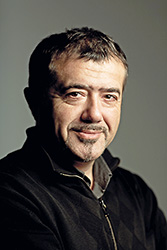 The backbone of his worlds are remarkable details, which, essentially, create the importance of our lives, and eventually the civilization. Readers unmistakably feel how much the writer truly inhabits his lines, how strong his emotion is. With Vladimir Pištalo, the reader is sure that the stake is the highest: trust in the reader and the world, entirely dedicated to searching for his self. The backbone of his worlds are remarkable details, which, essentially, create the importance of our lives, and eventually the civilization. Readers unmistakably feel how much the writer truly inhabits his lines, how strong his emotion is. With Vladimir Pištalo, the reader is sure that the stake is the highest: trust in the reader and the world, entirely dedicated to searching for his self.
From his first poetic prose to later novels, Pištalo has been breaking stereotypes with his narration. He is poetic enough to swing you beyond the real, he is close and dynamic, intriguing enough so, after reading, you continue swimming in the world that remains floating as a trace for a long time.
From novellas Corto Maltese and Alexandride, collections of stories, to the novel Tesla, Portrait among Masks, you have a tendency towards big biographies. In all those stories, one can feel the passion for revealing the world within one’s self through others. Is that an artistic fate or matter of decision?
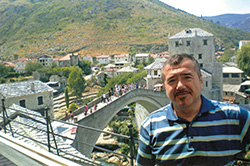 Not much is a matter of decision. Ivo Andrić wrote that the part of himself he chose is less important. And people don’t have this impression about Andrić. Let me be the devil’s advocate and say that these are not big, but small subjects, and that it all depends on the eye of the observer. Many think that Corto Maltese is a great comic book. And it is. However, I asked the children of the Zemun Gymnasium about Corto. Three of thirty in the class heard about it. My Alexandride is a story about Alexander the Great, as well as a version of Serbian Alexandride, a medieval novel in which Alexander was presented as a Christian hero. How many people know about such novels? I’m a bit suspicious about the tendency towards greatness, which sometimes appears in my books. I attempt to approach great subjects, so to say, in a small or unexpected way. I approached Venice from a Slavic aspect. The real world is a small world, said one poet. The truthfulness of a book is either revealed in a detail or not revealed at all. Paradoxically, the eternity of our lives is in details. Not much is a matter of decision. Ivo Andrić wrote that the part of himself he chose is less important. And people don’t have this impression about Andrić. Let me be the devil’s advocate and say that these are not big, but small subjects, and that it all depends on the eye of the observer. Many think that Corto Maltese is a great comic book. And it is. However, I asked the children of the Zemun Gymnasium about Corto. Three of thirty in the class heard about it. My Alexandride is a story about Alexander the Great, as well as a version of Serbian Alexandride, a medieval novel in which Alexander was presented as a Christian hero. How many people know about such novels? I’m a bit suspicious about the tendency towards greatness, which sometimes appears in my books. I attempt to approach great subjects, so to say, in a small or unexpected way. I approached Venice from a Slavic aspect. The real world is a small world, said one poet. The truthfulness of a book is either revealed in a detail or not revealed at all. Paradoxically, the eternity of our lives is in details.
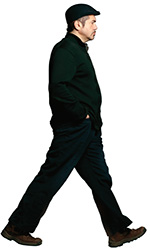 Searching through the world and symbolism of carnivals continues in Venice, and the book is considered as a bildungsroman or novel of metamorphosis? Searching through the world and symbolism of carnivals continues in Venice, and the book is considered as a bildungsroman or novel of metamorphosis?
The main metaphor in Venice is Metamorphosis, the inconstancy of the visible world. Most philosophers speak about the Being as a static category. Few of them speak about Creation as a constant process. The world is made and exists through Creation. Such was Heraclitus. Never in the same river twice. That’s how Ovidius thought about the world in his Metamorphosis. Such is my novel Venice.
If one takes a closer look, Venice is actually a series of miniatures, a series of picture-postcards composed as a novel. Did you have a vision of a novel at the beginning or did you compose the novel after noting sensations?
They are not only sensations. I had an idea what I want to say, not only in the form of images, but also in the area of ideas. (Images and ideas, in an exciting process, somehow fit into each other.) Of course I didn’t know how all that would fit in. If I knew, there wouldn’t be any revelation, no added value. If nothing surprises me in the process of creation, how will the reader be surprised? If everything I do is known to me, it will also be known to others. And vice versa.
WALKING WITH HIS GRANDFATHER’S STEPS
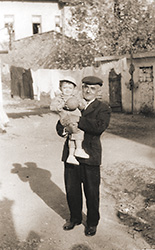 In Venice, as well as in Tesla and many stories, the thing is not only about introspection, but also about masks. The eternal question: what is a mask and what am I? The story how a human can be brought down to a lower form, animal form, and elevated into higher, heavenly realms, and that carnivals are places of such metamorphoses. Is the carnival in Venice actually a parabola for the constant state of civilization? In Venice, as well as in Tesla and many stories, the thing is not only about introspection, but also about masks. The eternal question: what is a mask and what am I? The story how a human can be brought down to a lower form, animal form, and elevated into higher, heavenly realms, and that carnivals are places of such metamorphoses. Is the carnival in Venice actually a parabola for the constant state of civilization?
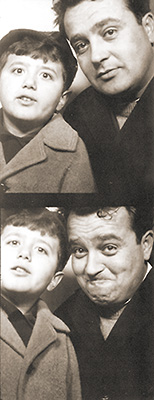 As in fairytales. One should recognize oneself among masks. One should recognize disguised others. Truths are disguised in illusions! And illusions are disguised in truths! One should recognize them. I don’t think it is the carnivalization Bakhtin wrote about. In ideological fairytales, the seed of illusion in the truth grows into a complete illusion in time. It should be re-recognized under a new mask. As in fairytales. One should recognize oneself among masks. One should recognize disguised others. Truths are disguised in illusions! And illusions are disguised in truths! One should recognize them. I don’t think it is the carnivalization Bakhtin wrote about. In ideological fairytales, the seed of illusion in the truth grows into a complete illusion in time. It should be re-recognized under a new mask.
The title Tesla, Portrait among Masks on one hand suggests that Tesla spoke a simple truth, as he saw it, among people who wear masks and adapt. On the other hand, the title points out the role of love (not towards mankind, but towards concrete human beings) in Tesla’s life. Only love makes the other person real. Without love, people remain masks for one another.
”Where does that leave me?” That sentence from Venice may open layers of stories about ancestors in us, about the ”suitcase of heritage” we carry through the world, about faces and steps we are traces of…?
People always told me I look like my father. However, whenever I start shaving, I see the stubborn jaw of my grandfather Spasa Pištalo in the mirror. He was a railway man and passed me the love for trains. I can only imagine how much smoke he inhaled riding on the Sarajevo-Dubrovnik railway. Besides, he looked like Chaplin when he was young. I don’t. He could walk on his hands. I can’t. He had a habit people considered strange when I was a child: every day he would go for a walk. He’d walk around the entire city of Mostar. I liked that, so I started going for walks very early. Those long walks remained a half-inherited, half-chosen habit. Since I go for walks every day, whether I’m in Worcester or in Boston, I walk through those cities with ”my grandfather’s steps”.
SEARCHING FOR VALUES
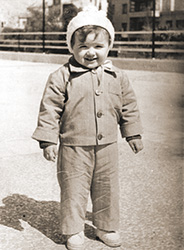 ”One can find another world without leaving the one we live in.” (Venice) About journeys, cities, lands...? ”One can find another world without leaving the one we live in.” (Venice) About journeys, cities, lands...?
While writing about Ivo Andrić, I found that journeys, whether we talk about intoxication with them or doubting them, are one of the most important subjects of our Nobel Prize winner. Notes from Rome, Sintra, Bursa, Istanbul, Madrid, Vienna, Krakow, Stockholm, Beijing, are scattered in Andrić’s prose.
After the Book on Andrić, which I’m writing now, I will write, or collect, a series of travelogues. Most of my travelogues are kept in notebooks and I need to take them out. Notes from Botswana, South Africa, Japan, Argentina, Brazil, Cuba, Egypt… are waiting for me. And many others. Yes, from Montevideo as well…
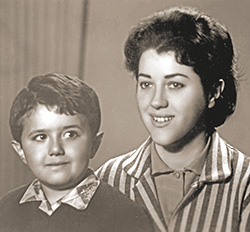 ”The Mediterranean – the eyes of my ancestors in the frescoes of Fiume.” (Venice) How much are we determined by the heritage of the nation we belong to? ”The Mediterranean – the eyes of my ancestors in the frescoes of Fiume.” (Venice) How much are we determined by the heritage of the nation we belong to?
My mother was a literature professor, so I knew the entire history of our literature, especially poetry, before I started learning it in school. As a boy, I knew many epic folk poems by heart. I forgot most of them, but the essence remained. And I know where to find what I need. I needed them while writing the novel about Tesla. Nikola Tesla read epic folk poems once a week. The folk gusle player Petar Perunović used to visit him in New York. While writing Tesla’s portrait, among masks, I chose two epic poems concerning my hero: ”Wedding of Milić Barjaktar” and ”Wedding of Dušan”.
Using the sensibility of those poems, I described Tesla’s experience of World War II. My English translator thus noticed that Tesla unites literary procedures from the most ancient to the most modern ones, from folk epics to symbolism, futurism, expressionism, surrealism. As well as realism and postmodernism. Following Tesla’s life from the preindustrial to the atomic age, the novel adjusts its language, reflecting the changing literary techniques.
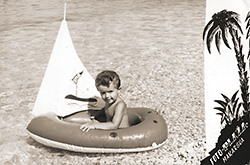 ”Your soul is a province or capital, regardless of the place you live in.” (Tesla) What people, experiences and paradigms from the Serbian cultural heritage should first be revitalized and reaffirmed today? ”Your soul is a province or capital, regardless of the place you live in.” (Tesla) What people, experiences and paradigms from the Serbian cultural heritage should first be revitalized and reaffirmed today?
Almost all. All those people who were rightfully on Serbian coins and banknotes and were later devaluated together with those banknotes, as they kept getting more and more zeroes. Minters of false money were later ashamed to print the real faces of great people on banknotes, so they began making generic faces, like photo-robots. The faces on the devaluated banknotes were no longer Andrić, Njegoš and Vuk, as we know them from photos, but faces drawn as if someone described them to a court artist and later printed on a hectograph: wanted! I believe those faces and their values are still wanted and searched for.
I invested years in some of those values and those faces. I dedicated two years to the symbol such as the city of Belgrade, writing my novel Millennium in Belgrade. I dedicated eight years to revealing and illustrating the story about Nikola Tesla. I will dedicate another few years to reviving the slipping away realities (in plural not in singular) of Ivo Andrić.
After that I would like to write a book or a long essay about the great writer Vladan Desnica.
NEW HISTORY OF OUR SOUL
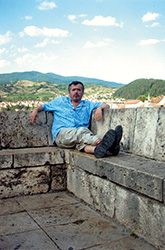 Your Tesla? Your Tesla?
A dark haired man, thin as a greyhound, tall, handsome. Always sick, always on the verge of a catastrophe, yet indestructible. Ready to take risks against general opinion, even unable not to take them. Indescribably stubborn. Intuitively talented author, with deep eyes, playing the role of a positivist following the trend of his time. They say he was able to evaluate the depth of a person at first glance and based on that decide how much time he would dedicate him or her. They say he could think about scientific problems while watching movies, watching through the movies in a way. They say he felt continuity through the buzz of time or even the city noise.
Your Andrić?
Ivo Andrić felt responsibility towards the reader, unmatched in our present time. He believed that literature is an offered helping hand, which can make a person sad, but mustn’t insult or discourage. He assumed that he, as a writer, may sometimes be someone’s only friend and advisor and that he mustn’t fail in that role. In our mocking culture, he warned that ”mockers are rarely right”. He attempted to see people from the inside, the way they see themselves. He never hesitated to console his reader, repeating that he or she is never alone in anything and never the first to experience something.
Your Crnjanski?
Last summer I read Crnjanski’s essays again. My attention was drawn by the fact that he was strongly against whining, complaining and dark subjects our literature was and is prone to. He liked Branko Radičević exactly for the fact that he introduced new, merrier, erotic subjects into our poetry. I was touched by the tendency towards light and joy in a poet who also knew how to lament. Regarding Andrić’s Ex Ponto, Crnjanski wrote that perhaps a new history of our soul begins with it. Joy and directness in it are more in form than in subjects. Crnjanski was a fighter for the new history of our soul.
ECHOES OF LANGUAGE IN THE TISSUE OF A HUMAN
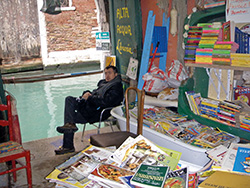 ”Seen from the outside, Serbian language is small, but its interior is spacious.” (Tesla) You live in the United States, but you write in Serbian; you once said that it’s your only way of expression? ”Seen from the outside, Serbian language is small, but its interior is spacious.” (Tesla) You live in the United States, but you write in Serbian; you once said that it’s your only way of expression?
The language you start speaking and speak in your childhood becomes part of you so much that it immediately provokes echoes in your tissue. In a matter of seconds, words turn into hopes, disturbances, discomfort, promises. They become your physical states. They become you. A word of the mother tongue personified in a second. This is what mainly poetry, but also prose, is based on. In a language you learn later, words are information, not a physical echo in your being. It remains a handshake in rubber gloves and a kiss after an injection of novocaine.
The archaic language, oneiric and thick experience on one hand, and the amazing easiness of moving through space and time, through the contents of the read, on the other, are balanced in your work from beginning to end. How did you 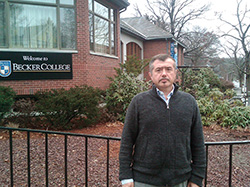 maintain such dynamics and lyrical expression through the years of writing? maintain such dynamics and lyrical expression through the years of writing?
By attention! Without rushing, neither in terms oflanguage nor subject. A writer must first conquer a certain language purity and build a language which is not common, but his own. There are words you particularly like, and there are those you know but never use, because they provoke a negative physical reaction in you. That’s the most difficult part of the job. Then a writer conquers his own initial subjects, usually related to defining his own being. Afterwards, gradually, he expands the circle of subjects. That is where experience helps. I wrote once that a young writer must and an older write shouldn’t be afraid of banality.
You say: Sarajevo, Mostar, Belgrade: these are my cities. You have been in Boston for a long time. As if your life is arranged through postcards and stories about cities?
I think in images, and that’s how I think about cities as well. I wrote a story about Mostar, which is my favorite, and which has a very original title – ”Mostar”. I wrote ”postcards” about Sarajevo and Boston. I wrote a novel about Belgrade – Millennium in Belgrade, and somehow I continue writing about it every time I visit it. I’m inspired by something I hear on the street or by graffiti. Perhaps a human with several cities has one of his selves in each of them, who greets him at the station or airport and imperceptibly merges with him when he goes for a walk.
***
In a Few Sentences
Born in Sarajevo in 1960. Graduated from the Faculty of Law in Belgrade, obtained his doctoral degree at the New Hampshire University in the US. He teaches world and American history at the Becker College in Worcester, Massachusetts. He published books of poetic prose: Picture Book, Nights, Manifests, End of the Century, novellas Corto Maltese and Alexandride, books of stories Vitrage in Memory, Stories from Around the World, novels Millennium in Belgrade, Tesla, Portrait among Masks and Venice.
Winner of NIN’s award, Award of the National Library of Serbia for the most popular book, ”Isidora Sekulić”, ”Moma Dimić”, ”Kočić’s Pen” award, as well as the ”Miloš Đurić” award (fro the translation of the poetry of Charles Simić from English). Translated into more than ten languages.
***
Respect for Respect
In the sound and fury our literary scene is overcome by, you stand on the side, belonging both to everyone and no one. Is the secret in the knowledge that ”without our soul there wouldn’t be anything” (Webster, Venice)?
Perhaps it concerns the soul and perhaps it’s about the investment in the text you mentioned in your introduction. One gets respect if one invests respect. That also refers to respect for the reader. You must treat the reader as if he or she is as good as you are in your best moments. However, this also wouldn’t mean anything without emotions. It’s not bad to like what you write about. You invest emotions to get emotions.
***
About Old Age
”The carnival showed what will be when I’m not me. When I become the wind, when I become the river, when I become the branches of trees. That’ll be the end of greediness. When I become: everything.” (Venice) How do you see yourself in twenty years and what kind of old age would you like?
If I were rich, I would do the same I’m doing now. If I were very old (rich in age), I would still do what I’m doing now. That would be nice old age.
***
Essential Question
”What is this world? What is the reason of existence?” (Tesla)
That’s the essential question. If a person lives his life without asking this question, it’s as if he was never born.
***
Dream of the Writer and Dream of the Reader
What is your relation towards what you have written?
My relation is such that in one moment I decided that there were enough versions of the story (fifteen in the case of Tesla), that there are no excessive words in the text or I’m not able to see them. That’s where my part of the dream ends. From that moment, it’s important what the reader dreams regarding the book. We can call it bouncing dreams. I think that dreams, meaning hopes and expectations, are the integral part of our character, more important than anything written in our ID card.
|
